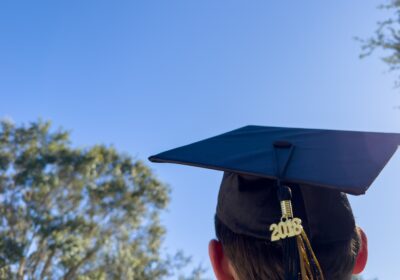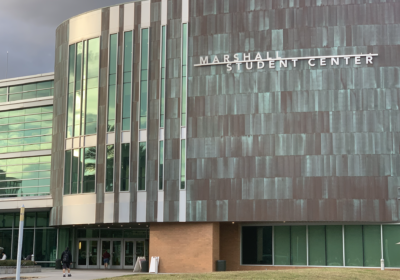Building a BRIDGE

The internal medicine clinic in the Morsani Center for Advanced Healthcare turns into the BRIDGE clinic in the evening.
SPECIAL TO THE ORACLE
The USF Building Relationships and Initiatives Dedicated to Gaining Equality (BRIDGE) Clinic is a free, student-run clinic available to members of the Tampa community who are unable to afford health care.
This year, the clinic was awarded a $40,000 grant, which will allow it to continue to provide free colon screenings, a major offering at the clinic. The grant was awarded by the Florida Association of Free and Charitable Clinics (FAFCC).
Located at the USF Health Morsani Center for Advanced Healthcare, the internal medicine clinic transforms into BRIDGE every Tuesday from 5:30 p.m.-9:00 p.m. The clinic provides a multitude of resources to patients, with services in primary care, physical therapy, social work, pharmacy and public health.
Money to keep these divisions stocked with medical technology and resources has been a struggle, but grants like the FAFCC’s donation and another from Florida Hospital are now making it possible to provide additional services, including specialty care by neurologists, psychiatrists, gynecologists and dermatologists.
Since 2007, BRIDGE has been servicing over 900 patients annually who fall 200 percent below the poverty line, according to Kristin Prewitt, executive director of BRIDGE. Some applicants to the clinic survive on $800 per month, she said.
Prewitt started working at BRIDGE as a first-year medical student in 2013 and is now a fourth-year, dual-MD-Ph.D. student. Upon graduation she will be an epidemiologist with a master’s in public health.
“Most of our patients are undocumented and Spanish speaking,” Prewitt said. “With Obamacare, many patients don’t have access to healthcare because a lot of them are undocumented. That’s why we make sure the services we provide are free for those in need.”
An additional partnership with Moffitt Hospital allows the patients who test positive during mammograms to have procedures done by surgical oncologists at Moffitt.
“Normally these patients would not have access to screenings like mammograms, as well as our colon cancer screenings,” Prewitt said. “Most free clinics will only have diagnostic screenings and no follow-up care. The great thing about working with Moffitt and what this clinic offers is (to) diagnose the patients and still offer treatment.”
Morsani doctors partnered with BRIDGE to generate screening initiatives for patients. Dr. Fred Slone is an attending doctor, USF professor and gastroenterologist who brought the colon cancer screening project to the clinic.
According to Mayssan Muftah, BRIDGE financial director and a fourth-year medical student at USF, Slone “is the biggest reason our colon cancer screenings are funded and patients are able to have access to colonoscopies.”
“I’ve seen BRIDGE grow (and) we are providing more and more services for our patients every year,” Slone said. “We are becoming one of the few clinics in the Tampa Bay area that can provide more procedures and advanced care than a lot of other clinics.”
One of BRIDGE’s patients, Deniese Moodie, has been with the clinic for two years and recently became unemployed.
“I’m very grateful I could find something like this to cater to all my medical needs in one place,” Moodie said. “Without (the clinic), I don’t know what I would have done. The people here have been very caring.”
An in-house pharmacy provides discounted pharmaceuticals with vouchers and alternative medicine for a more-affordable option.
“We can give our patients a script to go to the pharmacy, if the drug is $200, … we make sure the patients can still afford the care,” Prewitt said.
USF medical students have the opportunity to use the clinic as training in a professional medical environment. Third- or fourth-year medical students are paired with first or second year students as a “mentorship tiered interdisciplinary system,” according to Prewitt.
“The first real patient I ever saw was here,” Prewitt said. “It was amazing. You get really nervous, and to have a mentor walk you through the process also allows patient care not to be compromised.”
The medical students are accompanied by a social work student and a translator who meet with the patient to take their medical history and perform the physical exam. When the case is discussed with the attending physician, a plan will be developed and then the patient will be diagnosed.
Michelle Hummel, fourth-year medical student, has been volunteering with BRIDGE since her first year; and her mentee, Alanna Balbi, a first-year medical student, just attended her first day at BRIDGE.
“We evaluated one patient who had back and knee pain for several years that has gone untreated,” Hummel said. “We were able to prescribe an anti-inflammatory to help with pain, as well as referring her to physical therapy here at BRIDGE to work on strength and flexibility to combat the pain.”
In addition to the medical students, translators are also needed in the examination room.
Mery Yanez, third-year undergraduate student majoring in anthropology and biomedical science, has been translating Spanish for BRIDGE since she was a freshman.
“Being a pre-med student, I like how I can volunteer and shadow at the same time,” Yanez said.
USF student involvement in BRIDGE has impacted the role of every disciplinary department in the clinic. The Quality Improvement Project is meant to decrease patients’ time in the exam room and improve efficiency within the clinic.
Other projects were developed to improve patient-doctor communication. The program called Care Message sends text messages to patient’s phones to remind them to check their blood sugar, monitor blood pressure or attend an appointment to decrease clinic cancellations.
The clinic’s clientele has been able to expand by word of mouth. Seeing 10-12 patients a night has kept the clinic sustainable for nine years.
“We don’t have any open appointments until January,” Prewitt said. “We are fully booked.”
As the end of the year approaches, BRIDGE is beginning to accept donations for the BRIDGE Holiday Party. The fundraiser is held to provide gifts for patients’ children.
In addition to the gift collection, Santa will also be at the event in the BRIDGE office to take photos with the families. Two boxes will be placed around campus for gift collection in December: one box in the Physical Therapy building and the other at the Office of Student Affairs.
In addition to the invitation to donate, students are also encouraged to volunteer at the clinic, as well as the fundraiser.






